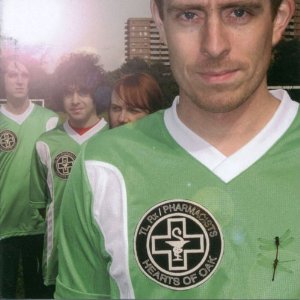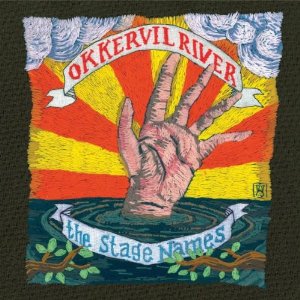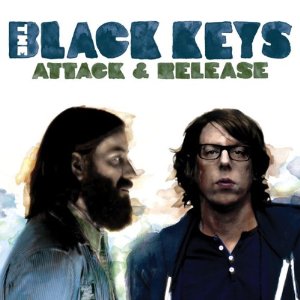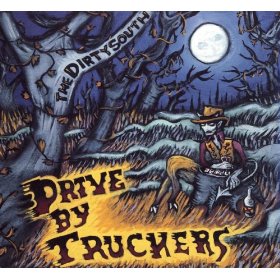bLISTerd: The 100 Best Albums Of The ’00s (90-81)
by Popblerd Staff on Feb 9, 2012 • 5:30 pm 2 CommentsWelcome back!
If you didn’t catch the first part of our list, you can locate it here. Now that you’re up to speed, let’s continue our countdown with Crazy Eyes Serj, his friend Crazy Beard, and the rest of System of A Down, who have two entries in this Top 100.
90. System of A Down Mesmerize (2005)
As a huge System of a Down fan, it almost pains me to split the fantastic Mezmerize/Hypnotize double album into separate entities, even though that’s how they were released. But if you held a gun to my head and asked me to pick just one half of the project, I’d go with Mezmerize. Based on singles alone, it was the far bigger album; “BYOB” became the angriest hit of the summer, with its psychotic “WHERE THE FUCK ARE YOU?” chorus blasting from stereos everywhere, the grooving chorus and party mantra masking the raw political outrage boiling just beneath the song’s surface. But that has always been the genius of System: the ability to take political outrage and make it mainstream, often slyly masking it in a way bands like Rage never could. Not all the album is a commentary on America, however. “Question!” is classic System, a soft-loud-soft musing on death and existence. The band even takes a stab at pseudo-opera, as “Revenga” sounds like it should be coming from the leading villain at the local playhouse. At the end of the day, beyond the protest and commentary, Mezmerize was simply the more fun album of the two, one that could coax listeners to singing lines like “My cock is much bigger than yours” and “It’s a violent pornography/Choking chicks and sodomy/The kind of shit you see on your TV” without the slightest bit of shame or irony. Stephen
 88. Radiohead Hail To The Thief (2003)
88. Radiohead Hail To The Thief (2003)
By the time Radiohead released their sixth studio album Hail to the Thief in 2003, they were already known for switching up their sound quite a bit. Their first albums were known for more of a stripped back, acoustic sound, while the two albums preceding Thief were more on the experimental/electronic spectrum of music. Hail to the Thief lands somewhere in the middle – while the sound is definitely still progressive rock, there’s a nice balance of busy electronic tracks and soft guitar ballads as well. The album makes some blatant political statements (for example, “2+2=5” is a direct reference to George Orwell’s classic dystopian novel “Nineteen Eighty-Four”, “Sit Down. Stand Up.” has obvious political references, and the album’s title is a play on “Hail to the Chief”, the march played to announce an appearance by the President of the United States), though frontman and songwriter Thom Yorke denied having any intent of making an anti-political statement or album. Lyrical themes aside, the album is full of unique, alluring, and sometimes downright eerie music. “Sail To The Moon” starts off sounding like a beautiful lullaby, but as soon as Yorke’s wailing vocals, paired with the haunting guitar riff from Jonny Greenwood, come into play, the track leaves you with an unsettling feeling. Same goes for the ominously titled track “We Suck Young Blood”; the staccato piano, Yorke’s scratchy delivery, those damn spooky hand claps in the background – everything about the track (in addition to the title, of course) sounds like it’d fit in well in a Vincent Price vampire movie. Then, of course, there’s “I Will” which again, sounds beautiful on the surface; some exquisite harmonizing between Yorke and guitarist Ed O’Brien are the sole composition of the track, besides some quiet guitar strumming. But the disquieting refrain of “little babies’ eyes” paired with lyrics that seem to describe a Holocaust of some sort bring back that unsettling vibe. Perhaps the album was merely written during a depressing point of Yorke’s life, but it definitely isn’t shiny happy music, not that Radiohead was ever known for making such music to begin with. What it is, however, is a collection of well-crafted songs, beautiful music and vocals, and lyrics that really mean something. It’s one of the best albums in Radiohead’s discography. Brittany
87. Regina Spektor Begin To Hope (2006)
Regina Spektor’s first album after making a minor splash with the excellent Soviet Kitsch finds the Moscow-born singer-songwriter zeroing in on a more commercially palatable style of songwriting, but that doesn’t mean Regina dropped a Liz Phair on everyone; the production’s cleaner, the melodies a bit catchier, but Begin to Hope takes some hard lefts during the course of its running time, its second half veering into the sort of rambling, borderline-crazy songwriting Spektor used to dabble in. The result is the best of both worlds, a release that harnesses Spektor’s talents for madcap brilliance and avant-garde experimentation _and_ her newfound ability to pen a charming corker of a pop song (“Better”, the career-best single “Fidelity”). Experiment: turn the bass up, roll up the windows, and pull up to a stoplight in an affluent suburb bumping “Fidelity”. See if the WASPs look at you funny because the song’s bass-heavy, 808 knock sounds like you’re listening to one of those terrifying hip-hop songs. Drew
86. Interpol Antics
Admittedly, I got on the Interpol bandwagon late and this was the first album I discovered thanks to the video for ‘Evil.’ This band is great at layering sound – just take ‘Evil,’ as an example, the bass bobs along, the guitars jangle, the keyboards soar in the chorus and ramble with the guitars midway through, all while the drummer holds the beat. As a whole,Antics is a brilliant brooding piece of music with spooky brilliant lyricism. Check out: ‘Evil,’ ‘Take You On a Cruise,’ and ‘Slow Hands.’ Kbox
85. Blackalicious Nia
In the year 2000, hip-hop’s indie scene was flourishing, so much so that the “underground” had become decidedly above ground. Not many were experiencing the commercial success that their mainstream counterparts were, but many names and reputations for classic, simplified old school style beats, and complex rhyme styles were being formed, like a subterranean army being created in preperation of a takeover mission. The soundtrack to the revolution must be Blackalicious’s brilliant debut album, Nia.
Chief XCel and Gift Of Gab are a rare and formidable duo, and Nia showcases their astounding production and lyrical skills, skills so great that they could never be held beneath sea level. Nia is chock full of beats so wonderfully crafted that the adage “less is more” has never been truer. Not needing to barrage every track with multiple horns, pianos and excessive sampling, Blackalicious simply allows the beats to speak for themselves, pure and stripped down, and so soulful. Lyrically, Gift of Gab is a monster, rhyming about every topic under the sun, from tales of artists who started out hungry but blew up and forgot where they came from (“Deception”) to his own expository dissection of the first 7 letters of the alphabet (“A to G”). He is a remarkable storyteller and lyricist, and most of all a true Master of Ceremonies, capable of hanging with anybody on any top 10 list. Lyrics and beats combine famously and brillance ensues. Nia is beautiful. At a time where the underground was charged with “keeping it real”, Blackalicious led the pack and Nia supplied the sounds. Chuck
 84. Ted Leo & The Pharmacists Hearts Of Oak (2003)
84. Ted Leo & The Pharmacists Hearts Of Oak (2003)
Ted Leo had a productive decade, cranking out quality albums of punk-fueled, occasionally political indie rock every couple of years or so. In my opinion, his best work was 2001’s The Tyranny of Distance, but Hearts of Oak isn’t far behind it. Leo and his Pharmacists alchemized a mix of The Clash and Thin Lizzy that is catchy, strident and completely rocking. “Where Have All the Rude Boys Gone?” is a standout track, harking back to the reggae rock scene in the UK in the late ‘70s. “The Ballad of the Sin-Eater” is a Dubya-era protest song about America’s standing in the world, featuring the caustic refrain “You didn’t think they could hate you, did you?” Leo combines politics with actual partying on “The High Party” and reminisces about his days living in Boston on “Bridges, Squares.” Hearts of Oak was a preview of great things to come from Leo in the rest of the decade. Koomdogg
 83. Okkervil River Stage Names (2007)
83. Okkervil River Stage Names (2007)
Okkervil River spent the ‘00s quietly releasing excellent albums such as 2005’s Black Sheep Boy, but it wasn’t until that album’s follow-up, The Stage Names, that people started paying attention. The Austin-based band (essentially singer-songwriter Will Sheff and a rotating cast of musicians) specializes in an especially literate brand of folk-influenced indie rock. The Stage Names is chock full of references to movies, TV and other songs, especially in “Plus Ones,” which name checks a number of songs including R.E.M.’s “Seven Chinese Brothers” and The Commodores’ “Three Times a Lady” by adding one to them. A world-weary Sheff examines the oversaturation of pop culture on our lives and what it means, if anything. The results are immensely rewarding. Koomdogg
 82. The Black Keys Attack & Release
82. The Black Keys Attack & Release
The first decade of the new millennium, for all its autotune, samples, and post-production, still saw a surprising amount of throwback bands, taking their sound cues from the 70s and even before. While The White Stripes will probably stand as the biggest of the decade’s retro revivals, for my money the Black Keys have been the more vital of the groups, especially in the back half of the decade. I’ll be honest: for my money Rubber Factory is their best work, but their breakout hit Attack and Release is the one for while they’ll be most remembered, and for good reason; it’s a fantastic bluesy album – cool, sexy, laidback, grooving – carried by the croons of Dan Auerback and the swinging drums of Patrick Carney. Their second single, “I Got Mine”, is a toe-tapping masterpiece, mixing straightforward blues with master producer’s Danger Mouse’s electronic flourishes to make the ultimate rock radio hit. The bass drum driven “Strange Times” takes things in a darker angle but still keeps the head-bobbing qualities of the album. Later tracks branch off into soul, ballads, and straight ahead rockers yet all carry the trademark Keys sound. While some my decry the more polished studio sound of Attack compared to their earlier, sparser sounding releases, the end result is a deeper, richer, more layered production, adorned with soulful choirs, organs, electric drums, and all the touches Danger Mouse brings to the game. Stephen
81. DJ Shadow The Private Press (2002)
DJ Shadow has reached a point in his career where everything he releases will inevitably garner some comparison to his debut (1996’s instant classic Endtroducing…), and in the immortal words of Oliver Wendell Holmes, that is some fucking bullshit. He’s released three excellent turntable mixtapes with Cut Chemist, produced the only UNKLE album with any consistent longevity and has composed instrumental standouts for artists ranging from Zack de la Rocha to Blackalicious. He’s had a great artistic career—one that’s completely undeserving of the “one-album wonder” stigma attached to it.
The Private Press was Shadow’s official follow-up to Endtroducing—twelve spacious instrumentals pieced from record crates across the country (bookended by two audio telegrams). However, there’s a marked difference between the two albums. Endtroducing was a snapshot of the mid-nineties metropole, filled with black glacial skylines, labyrinthine subway networks, coffeehouses veiled in hard-bop and nicotine, back alley punk rock dives, record stores like vinyl sanctuaries, police sirens cleaving through project buildings—you know, how people who’ve never been to New York more or less imagine New York. The Private Press takes a more introspective approach. There’s a melancholic haze over several of these tracks, and Shadow covers some pretty heavy subject matter, at least for a sample-based instrumentalist (growth, death, change). There’s also more subtlety to his compositions here, more depth. Not to say that every track here is somber and bleak, but there’s a maturity on this album that wasn’t particularly evident on his debut. As close to perfection as instrumental hip-hop / electronica / whatever the fuck you want to call it gets. Greg


2 comments
Mike A. says:
Feb 11, 2012
Greg, killer review on “The Private Press”. Glad to see I am not the only one who not only loves it, but thinks it is superior to “Endtroducing”.
Greg says:
Feb 11, 2012
I love both albums, but it took me several years to come around to “Endtroducing.” “The Private Press” hooked me at first listen, and I still find new stuff every time I play it. Glad I’m not the only one who appreciates it.